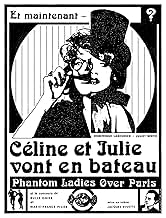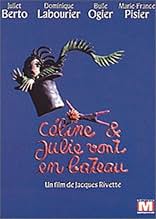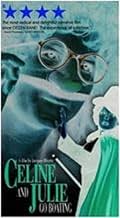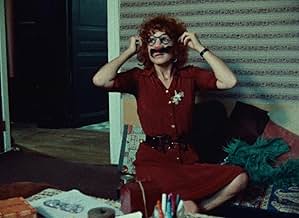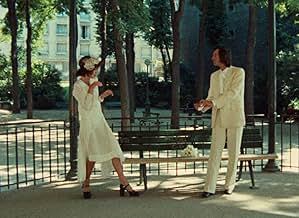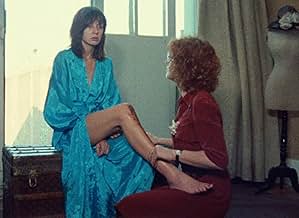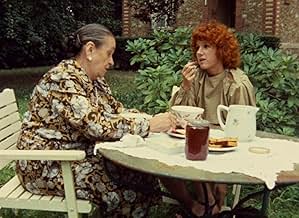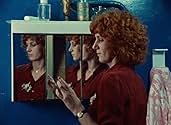Celine and Julie Go Boating
Original title: Céline et Julie vont en bateau : Phantom Ladies Over Paris
IMDb RATING
7.2/10
6.9K
YOUR RATING
A mysteriously linked pair of young women find their daily lives preempted by a strange boudoir melodrama that plays itself out in a hallucinatory parallel reality.A mysteriously linked pair of young women find their daily lives preempted by a strange boudoir melodrama that plays itself out in a hallucinatory parallel reality.A mysteriously linked pair of young women find their daily lives preempted by a strange boudoir melodrama that plays itself out in a hallucinatory parallel reality.
- Awards
- 1 win total
Jean-Claude Biette
- Spectateur au cabaret
- (uncredited)
Jacques Bontemps
- Lecteur à la bibliothèque
- (uncredited)
Michel Caen
- Spectateur au cabaret
- (uncredited)
7.26.9K
1
2
3
4
5
6
7
8
9
10
Featured reviews
a film for aging children......
When I first saw this film I was amazed by it. The freshness and the imagination of the two protagonists, the way in which it recognised the magic (real magic) of Paris, and the strange parallel worlds it created in which Celine and Julie are both deeply involved and creating, and then acting, their own parts. On re-viewing it more than ten years later though, I was surprised to be a little disappointed. The magic is so thin. Celine and Julie have taken the, very conscious and explicit, decision not to grow up, and as a result, although they are beautiful adults, their world is a child's world. Their imagination is child-like, in its imagery (sweets, plastic "dinosaur eyes", rather thin puns), in its chosen surroundings (cases full of dolls), its disasters (a grazed knee), its aims (largely disruption of the concerns of surrounding adults), in its ridiculing of sexuality and its steadfast refusal to admit that fantasy is sometimes, necessarily, dangerous. Without any danger or any desperation, it seemed on second visit a charming but slightly futile game.
Thoughtful but difficult
I recommend people read "Excruciating" (federovsky, 8/30/12) and "Much Ado About Nothing" (Milan, 4/15/2012) if they want to know what they are in store for. "Celine and Julie Go Boating" is difficult, frustrating and over long. However, it is also the kind of film that after seeing it, you wonder what other people have to say about it.
I didn't enjoy it much. Visually, it is not terribly special. The relationship between the two women and the "haunted house" is what keeps us watching, but the scenes come very slowly.
Several people have said it unfolds like a dream. Others have pointed out the lesbian/feminist side to it. Another possibility is that the two women represent two personalities of a schizophrenic nurse who committed an unspeakable crime. That would explain the repetitive cutting between one woman as the nurse and then her counterpart switching in. The two sides of the same madwoman angle possibly explains why the story includes the woman who is a performance amateur subbing for the experienced magician.
Between "Celine" (Juliet Berto) and "Julie" (Dominique Labourier), I think Labourier is the strongest here. Labourier has a lot of charisma; too bad Rivette has her often just laughing directly into the camera.
The characters in the "haunted house" are interesting. Marie-France Pisier is a favorite of mine, and she is very mysterious here.
If the scenes didn't unfold so sluggishly, and if the narrative were tighter, I think it would have been great. Unfortunately, it is too much work to recommend.
I didn't enjoy it much. Visually, it is not terribly special. The relationship between the two women and the "haunted house" is what keeps us watching, but the scenes come very slowly.
Several people have said it unfolds like a dream. Others have pointed out the lesbian/feminist side to it. Another possibility is that the two women represent two personalities of a schizophrenic nurse who committed an unspeakable crime. That would explain the repetitive cutting between one woman as the nurse and then her counterpart switching in. The two sides of the same madwoman angle possibly explains why the story includes the woman who is a performance amateur subbing for the experienced magician.
Between "Celine" (Juliet Berto) and "Julie" (Dominique Labourier), I think Labourier is the strongest here. Labourier has a lot of charisma; too bad Rivette has her often just laughing directly into the camera.
The characters in the "haunted house" are interesting. Marie-France Pisier is a favorite of mine, and she is very mysterious here.
If the scenes didn't unfold so sluggishly, and if the narrative were tighter, I think it would have been great. Unfortunately, it is too much work to recommend.
Excruciating
Some directors use less than 2% of their footage in the final cut but Rivette must have used 92% of his to make this - perhaps he used absolutely everything, including, apparently, out-takes. Tedium sometimes has a point, but not here. This is annoying-tedium for every scene seems calculated to test our patience. There's no humour or verve or flair or great lines or classic scenes, not even sad attempts at those things, only a forced drollerie that falls flat in every scene There is endless silly giggling, scenes such as those in the nightclub that are just tiresome to watch, fantasy sequences that are presumably meant to look like a corny TV sitcom, but, lacking any scrap of humour, the point is entirely lost and the actors flounder. The girls try far too hard to be cute, and only succeed in being cloying. And I'm waiting for a director to grasp this simple truth: that giving the actors free rein does not make the action more spontaneous and natural, only more strangulated, more self-conscious, more unnatural and cringe-inducing than if they were following a consistent and meticulous script.
After a while you realise Rivette is just playing silly buggers. Fluffed lines are left in, characters glance inadvertently-deliberately at the camera. Rivette will be saying: 'Regard, c'est un film that is pas un film, we're deliberatement toying avec your illusions'. I'm saying: Vous etes un wankeur.
Why three hours? A Senses of Cinema article is eager to explain: 'The tradition of rigid adherence to the 90 minute to 2-hour time frame, enforced by the laws of free market capitalism, is exploded by Rivette. As a filmmaker, Rivette refuses to confine himself to these arbitrary lengths, or to the even more arbitrary, if unspoken, rules about demands on subject matter and mise-en-scène in films of epic length. Instead, Rivette extends the lengths of his films to a point beyond necessity, where it is understood that the film's length in and of itself is a statement about the system he works in and rebels against.' 3 hours simply to defy (capitalistic??) convention? Wankeur.
The audience are the dupes here - poked fun at for trying to apply reality to what is self-consciously only a film. This is not New Wave. I'm gazetting Rivette as a hanger-on, a copyist. He wants to shoot in the style of Rohmer, but he hasn't got Rohmer's indefinable deftness. He wants to break the rules like Godard but he has not got Godard's indefinable style or charisma. He wants to say something meaningful in an offhand way, like Truffaut, but he hasn't got that indefinable intellect for it. All he can do is try. You can feel him trying. It boils down to a single lame joke that isn't funny and a single idea that isn't clever. Three hours of film-flam, tiresome beyond belief.
After a while you realise Rivette is just playing silly buggers. Fluffed lines are left in, characters glance inadvertently-deliberately at the camera. Rivette will be saying: 'Regard, c'est un film that is pas un film, we're deliberatement toying avec your illusions'. I'm saying: Vous etes un wankeur.
Why three hours? A Senses of Cinema article is eager to explain: 'The tradition of rigid adherence to the 90 minute to 2-hour time frame, enforced by the laws of free market capitalism, is exploded by Rivette. As a filmmaker, Rivette refuses to confine himself to these arbitrary lengths, or to the even more arbitrary, if unspoken, rules about demands on subject matter and mise-en-scène in films of epic length. Instead, Rivette extends the lengths of his films to a point beyond necessity, where it is understood that the film's length in and of itself is a statement about the system he works in and rebels against.' 3 hours simply to defy (capitalistic??) convention? Wankeur.
The audience are the dupes here - poked fun at for trying to apply reality to what is self-consciously only a film. This is not New Wave. I'm gazetting Rivette as a hanger-on, a copyist. He wants to shoot in the style of Rohmer, but he hasn't got Rohmer's indefinable deftness. He wants to break the rules like Godard but he has not got Godard's indefinable style or charisma. He wants to say something meaningful in an offhand way, like Truffaut, but he hasn't got that indefinable intellect for it. All he can do is try. You can feel him trying. It boils down to a single lame joke that isn't funny and a single idea that isn't clever. Three hours of film-flam, tiresome beyond belief.
Overlong and difficult to watch with the interesting themes and material stretched surprisingly thin
Julie is a quiet and quite shy librarian who is in the park reading her book when a sort of white rabbit runs by in a hurry dropping stuff as she goes. Julie follows the girl to return her glasses etc but loses her, only for the girl (Celine) to turn up at Julie's workplace and put their two lives together. Julie discovers that Celine has been visiting a mysterious house during the day but leaving without a memory of what happened to her in there, so she decides to visit it as well only for the same to happen to her. The pair try to remember what they have gone through and gradually piece together that the house is trapped in a ghostly loop of the day a young girl was killed.
This plot summary is perhaps a bit flattering to the film because it does suggest that this is a tight little mystery with an element of magic and the supernatural to it, however nothing could really be further from the truth. As others have said this film is not really so much about what it seems, but few reviewers here have been able to shed much light on what it is actually about, with the majority just gushing about what a wonderful experience it is. I do concede that watching the film is an experience because it is very different from a lot of stuff I have seen before, but that does not necessarily read that it is brilliant as a result. I know there are things here that I am missing and I'm sure I'm being a total philistine, but it does seem that some people (particularly those who can barely stretch their love of the film to longer than a few lines of text) seem to be falling over themselves to praise a French art film for being, well, French and arty.
It was difficult for me to get through, I'll be honest, because it is very long by anyone standards. The first hour seems to be mostly silent and very, very little happens. Later in the film we do get more into the mystery of the house but even this is stretched to the point where it is hard to really care. Rivette has directed with a nice hand, using edits and atmosphere to produce a sense of wonder where really there isn't one. It does seem like his way of letting his cast explore has helped produce some of this natural air of imagination but I did wish that someone had maybe suggested to him that he reign it in to some degree but I guess nobody did (although seeing some of his other work, maybe this is him in total control!). The overall theme of childhood and imagination within this Alice in Wonderland rip is OK to discuss and think about but it is nowhere near interesting or clever enough to justify the long running time given to it here.
The cast do well to improvise and both Berto and Labourier have bought into the material well, producing the imaginative wonder and lack of restraint that the material needed it never seems like they are questioning anything they are presented with, which is pretty important with all the crossing of identities etc. Outside of them though there really isn't anyone else as the "ghosts" are mostly quite stagy and unconvincing.
Overall then an interesting film on paper but a frantically difficult one in reality. I'm sure many viewers will fall for its meandering scenes and imaginative subtexts but for me personally I found myself "getting it" quite quickly but then still forced to watch the scenes as they drag on. Call me a philistine if you wish, but I didn't really see what all the fuss was about and didn't find the heart of the film to reach me as it appears to have done with other viewers. Have a go by all means but please see it for yourselves and don't let the critical hype tell you what you "should" see.
This plot summary is perhaps a bit flattering to the film because it does suggest that this is a tight little mystery with an element of magic and the supernatural to it, however nothing could really be further from the truth. As others have said this film is not really so much about what it seems, but few reviewers here have been able to shed much light on what it is actually about, with the majority just gushing about what a wonderful experience it is. I do concede that watching the film is an experience because it is very different from a lot of stuff I have seen before, but that does not necessarily read that it is brilliant as a result. I know there are things here that I am missing and I'm sure I'm being a total philistine, but it does seem that some people (particularly those who can barely stretch their love of the film to longer than a few lines of text) seem to be falling over themselves to praise a French art film for being, well, French and arty.
It was difficult for me to get through, I'll be honest, because it is very long by anyone standards. The first hour seems to be mostly silent and very, very little happens. Later in the film we do get more into the mystery of the house but even this is stretched to the point where it is hard to really care. Rivette has directed with a nice hand, using edits and atmosphere to produce a sense of wonder where really there isn't one. It does seem like his way of letting his cast explore has helped produce some of this natural air of imagination but I did wish that someone had maybe suggested to him that he reign it in to some degree but I guess nobody did (although seeing some of his other work, maybe this is him in total control!). The overall theme of childhood and imagination within this Alice in Wonderland rip is OK to discuss and think about but it is nowhere near interesting or clever enough to justify the long running time given to it here.
The cast do well to improvise and both Berto and Labourier have bought into the material well, producing the imaginative wonder and lack of restraint that the material needed it never seems like they are questioning anything they are presented with, which is pretty important with all the crossing of identities etc. Outside of them though there really isn't anyone else as the "ghosts" are mostly quite stagy and unconvincing.
Overall then an interesting film on paper but a frantically difficult one in reality. I'm sure many viewers will fall for its meandering scenes and imaginative subtexts but for me personally I found myself "getting it" quite quickly but then still forced to watch the scenes as they drag on. Call me a philistine if you wish, but I didn't really see what all the fuss was about and didn't find the heart of the film to reach me as it appears to have done with other viewers. Have a go by all means but please see it for yourselves and don't let the critical hype tell you what you "should" see.
10Corwin-3
A celebration of childlike imagination
Movies would seem to be the ideal medium for surrealism, yet there are almost no good surrealist movies. There is the venerable "Un Chien Andalou", and there is "Celine et Julie vont en Bateau", and that might well be the lot. "Celine et Julie" has been one of my favorite films since I first saw it in the 1970s, because it is hypnotic, thought-provoking, mysterious, and funny, all at once. Its overall style could be described as magical realism, in which the quotidian life of Paris serves as a mere background for the magical fantasy life of the protagonists, two young women on a psychic journey, which may or may not end in madness ("vont en bateau", which literally means "go boating", is also slang for "go crazy").
The film is made of moments that seem to happen outside of time. In fact, the passage of time, the succession of events in everyday life, becomes an intrusion on the increasingly shared inner life of the two women, and each takes (hilarious) action to prevent those intrusions from continuing. They determine, in effect, that they must return as adults to their childhood in order to change the past. This may sound like a boring Freudian nightmare, but there is no heavy-handed psychologizing in the movie; it is all play, lighthearted yet beautifully composed. The sound-track is particularly effective, almost hyperrealistic, with no background music. The click of heels on pavement, or the motor of a taxi, loom out of the silence as in a dream, which the movie may be, at its heart.
I give this one a 10. You probably know already whether you would like it. If so, see it in a theater if you can, and on video if you must, but don't miss it.
The film is made of moments that seem to happen outside of time. In fact, the passage of time, the succession of events in everyday life, becomes an intrusion on the increasingly shared inner life of the two women, and each takes (hilarious) action to prevent those intrusions from continuing. They determine, in effect, that they must return as adults to their childhood in order to change the past. This may sound like a boring Freudian nightmare, but there is no heavy-handed psychologizing in the movie; it is all play, lighthearted yet beautifully composed. The sound-track is particularly effective, almost hyperrealistic, with no background music. The click of heels on pavement, or the motor of a taxi, loom out of the silence as in a dream, which the movie may be, at its heart.
I give this one a 10. You probably know already whether you would like it. If so, see it in a theater if you can, and on video if you must, but don't miss it.
Did you know
- TriviaIt is a misconception that most of the film was improvised by the actors. Jacques Rivette provided structure but did not let his actors "go wild", instead he let them write. A single scene was improvised, where Celine, played by Julie Berto, brags to her associates about her rich American friend. The rest of the scenes where shot from scripted material, mostly thanks to participating actors. The film is collaboration by several authors, including actors Berto, Labourier, Ogier and Pisier. Rivette's involvement in the writing was to give structure to all the contributions, tightening things up.
- GoofsThe last time Julie receives the cigarette from under the table, it is bigger than it was when her colleague handed it to her.
- ConnectionsFeatured in Berlin Chamissoplatz (1980)
- How long is Celine and Julie Go Boating?Powered by Alexa
Details
Box office
- Gross US & Canada
- $31,452
- Opening weekend US & Canada
- $5,624
- May 6, 2012
- Gross worldwide
- $31,452
- Runtime
- 3h 13m(193 min)
- Sound mix
- Aspect ratio
- 1.37 : 1
Contribute to this page
Suggest an edit or add missing content


